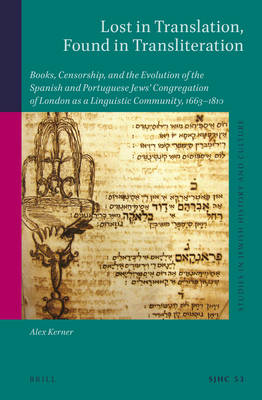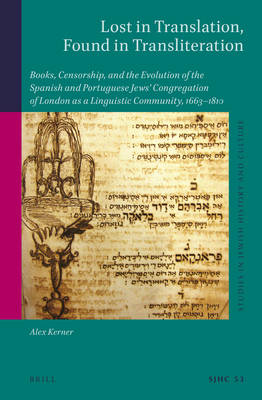
- Retrait gratuit dans votre magasin Club
- 7.000.000 titres dans notre catalogue
- Payer en toute sécurité
- Toujours un magasin près de chez vous
- Retrait gratuit dans votre magasin Club
- 7.000.0000 titres dans notre catalogue
- Payer en toute sécurité
- Toujours un magasin près de chez vous
Lost in Translation, Found in Transliteration
Books, Censorship, and the Evolution of the Spanish and Portuguese Jews' Congregation of London as a Linguistic Community, 1663-1810
Alex Kerner
282,45 €
+ 564 points
Description
In Lost in Translation, Found in Transliteration, Alex Kerner examines London's Spanish & Portuguese Jews' congregation in the seventeenth and eighteenth centuries, as a community that delineated its identity not only along ethnic and religious lines, but also along the various languages spoken by its members. By zealously keeping Hebrew and Spanish for prayer and Portuguese for community administration, generations of wardens attempted to keep control over their community, alongside a tough censorial policy on book printing. Clinging to the Iberian languages worked as a bulwark against assimilation, adding language to religion as an additional identity component. As Spanish and Portuguese speaking generations were replaced with younger ones, English permeated daily and community life intensifying assimilationist trends.
"His focus on books as an indicator of the importance of language in the London community is well presented, and Kerner's clear description of the varying uses of Spanish, Portuguese, and Hebrew (and later, English) by the Sephardim in London gives a good survey of the changes in the community over the 150 years covered by the book.... Highly recommended." - Michelle Chesner, Columbia University, in: Association of Jewish Libraries News and Reviews 1.1 (2019)
"Alex Kerner's admirable study is a valuable contribution to our knowledge of the interrelationships between language and censorship and their maintenance of community identity." - Barry Taylor, The British Library, London, in: Bulletin of Spanish Studies 96 (2019)
"This volume is a significant contribution to the well-researched history of the Spanish and Portuguese Jews of London, providing a clear and nuanced in-depth analysis of the reasons for and history of its censorship policy." - Wendy Filer, King's College London, UK, in: Journal of Jewish Studies 70.2 (2019)
"His focus on books as an indicator of the importance of language in the London community is well presented, and Kerner's clear description of the varying uses of Spanish, Portuguese, and Hebrew (and later, English) by the Sephardim in London gives a good survey of the changes in the community over the 150 years covered by the book.... Highly recommended." - Michelle Chesner, Columbia University, in: Association of Jewish Libraries News and Reviews 1.1 (2019)
"Alex Kerner's admirable study is a valuable contribution to our knowledge of the interrelationships between language and censorship and their maintenance of community identity." - Barry Taylor, The British Library, London, in: Bulletin of Spanish Studies 96 (2019)
"This volume is a significant contribution to the well-researched history of the Spanish and Portuguese Jews of London, providing a clear and nuanced in-depth analysis of the reasons for and history of its censorship policy." - Wendy Filer, King's College London, UK, in: Journal of Jewish Studies 70.2 (2019)
Spécifications
Parties prenantes
- Auteur(s) :
- Editeur:
Contenu
- Nombre de pages :
- 296
- Langue:
- Anglais
- Collection :
- Tome:
- n° 53
Caractéristiques
- EAN:
- 9789004367036
- Date de parution :
- 05-07-18
- Format:
- Livre relié
- Format numérique:
- Genaaid
- Dimensions :
- 160 mm x 236 mm
- Poids :
- 544 g

Les avis
Nous publions uniquement les avis qui respectent les conditions requises. Consultez nos conditions pour les avis.






